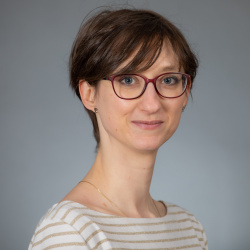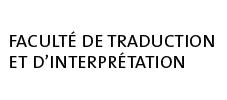Avril 2021
Entretien
Spotlight on... Aurélie Picton

Lisez cet entretien en français
Aurélie Picton has been an Associate Professor in the Department of Translation Technology (TIM) since 2011. She is in charge of teaching and conducting research in the field of terminology. She is also an associate member of the Observatoire de linguistique Sens-Texte (Université de Montréal). Her research deals with variation in terminology, corpus linguistics and the ergonomics of translation. Today, she will be talking to us about terminology at the FTI and the work carried out by her team.
Could you briefly explain to us what terminology is and how you came to be involved in this field?
In terminology, we look at words that are used in contexts involving specialised language, for example, professional practices in specific domains or technical fields. As with all human communication, various issues and needs can emerge in relation to these words, which are called terms. These needs can be extremely diverse and often arise in highly disparate situations.
I first became involved in terminology with the Centre national d’études spatiales (Cnes). The Cnes was struggling with how to manage knowledge and keep track of its development in long-term space projects (10 to 30 years). From start to finish, concepts can evolve, along with the names that are used to designate them. If we’re talking about concepts and specialised knowledge, then we’re talking about terms. The Cnes needed specialists in terminology and applied linguistics to come up with methods to identify, understand and keep track of these developments through the texts produced within these projects.
So you associate terminology with applied linguistics? And how is this all related to translation?
Although terminology is an independent discipline, it still has close ties to many other disciplines that deal with concepts and specialised knowledge, including specialised translation, documentation, linguistics, and the representation and transfer of knowledge.
Although I come from a linguistic perspective, specialised translation is still one of the predominant fields that makes use of terminology, for example when choosing between equivalent terms, identifying collocations or developing terminographic resources, which are kinds of dictionaries that describe terms and their meanings and uses.
One of the strong points of our team is that we come from a variety of different backgrounds in linguistics, translation and communication. We can draw from this wealth of skills in our teaching, thus exposing our students to a versatile skillset that can enhance their professional prospects. It’s also very important for us to collaborate with national and international partners in order to help them fulfill their translation and terminography needs.
What are some examples of these needs and how do they fit in with your activities?
In terms of teaching, our students help create multilingual terminological resources (an activity known as “terminography”) in collaboration with our partners, which include international organizations, companies and government agencies.
As for our research, we received a request from the Cnes, in partnership with Université Toulouse – Jean Jaurès, to find out how knowledge on space has “pervaded” the general public over the last 50 years. From a terminological standpoint, this question allows us to examine how terms flow from specialists to the general public, beyond the well-known processes of vulgarisation, providing us with insight into how knowledge spreads and contributes to the expansion of the general lexicon. We also participated in developing the Humanitarian Encyclopedia, a project led by the Geneva Centre of Humanitarian Studies. One of the challenges was to create a resource that would allow us to better understand why there are differences in usage or a faulty understanding of certain concepts in the field. This resource was developed for those involved in humanitarian work all over the globe, both in the academic world and in the field. In such a vast context, terminological issues include a need to reflect on how terms vary between different users, possible methods to describe these variations and the best format for a given resource (for example, with different customisation, collaboration and visualisation options).
Another one of our research axes, which is closely related to ergonomics, seeks to understand how these kinds of resources are used in practice. We began carrying out this research in the context of the ANR Cristal project, which gave us the opportunity to observe specialised translators in action. We studied the utility and use of varying resources that present the terms in context (for example, the sentences in which they appear), as opposed to providing definitions like standard dictionaries. This project enabled us to hone in on why translators need to consult these resources, when they consult them and what information is relevant for their work.
How do you handle these projects and requests?
In our team, we work with corpora and computer software. In other words, we mainly work with real textual data produced by specialists and make use of software to help identify and analyse major linguistic phenomena. We also work hand in hand with these specialists to develop an interpretation of the data that is in line with their needs.
When it comes to observing the translators “in action”, we have developed “ecological” protocols in order to respect the working environment of these language specialists. We gather recordings of their keyboard, screen and mouse activities, and also distribute questionnaires and carry out interviews in focus groups.
What are the current and upcoming challenges in your discipline?
There are plenty of challenges, which is what makes it so stimulating! Communication needs involving specialised knowledge are extremely rich – and they are only continuing to pick up speed. We need terminology more than ever.
The variety of these needs is considerable and new ones are constantly emerging. For example, with regard to our project on the circulation of terms, there is currently a need for more research on the role of social media in transmitting specialised knowledge. Potential resources available to translators are constantly evolving and becoming more dynamic in terms of their content, as well as their form. We also need to find out more about their uses and ergonomics.
Certain fields, such as the medical field, have more demand than others. We have a new PhD candidate who is looking how the terminology of chronic illnesses is used by patients known as “partners”. These patients suffer from a chronic illness and are designated to provide support and guidance for other patients. The terminology they employ is proof of their expertise. It is vital for us to understand how they acquire and use this terminology.
Finally, the data that we use to analyse and create resources may become increasingly voluminous, driving a need for new computer tools to process it. For example, there are machine learning approaches to big data that can be adapted to specialised corpora. These corpora are not exactly comparable to big data, as they are often smaller and contextualised in a specific field or situation. This is yet another topic that our team is currently exploring.
